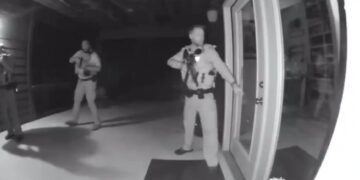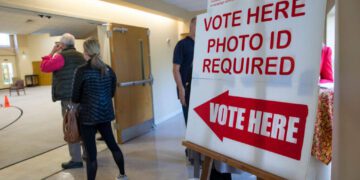By John F. Di Leo -
Rush Hudson Limbaugh III, 1951-2021, R.I.P.
He promised us "I won't stop until everyone agrees with me.”
Rush tried harder than any politician to keep his promise. For four years on a local show in Sacramento, then for over 32 years on his syndicated national radio program, he redefined the medium to blend news, philosophy, education and entertainment in a brand new way, serving as the inspiration and ally of generations of patriotic Americans.
Struggling to find his place in the world in his youth, he left college to work as a music station disk jockey for a few years, then as a baseball team’s PR man for a few more. But then he got the Sacramento gig at 32, where he was able to hone a version of talk radio that had never been seen before. After spending those first 32 years looking for the place he could make the greatest impact, he found a way to spent his last 32 years embodying Excellence In Broadcasting for a national audience.
The Public Man
Rush was one of those wise counsellors who told his audience, “find a job you love, and you’ll never work a day in your life.” He found that job, and then, as much as he liked going golfing, or watching football and baseball games, he was never as happy as when he was fulfilling his calling in the studio.
When Rush entered the national market, AM radio was largely comprised of cheap local ethnic and specialty stations, news, weather, sports, and programming of limited demographic appeal. All the popular action, the top 40 country, pop, classical, etc., was found on the FM dial. Rush quickly became the cornerstone of the growing radio talk show market. Much like a department store serving as the anchor of a local mall, the three hour Rush Limbaugh program was the feature that drew people to his stations. We would set our car radios’ first presets to the station that carried Rush, creating new opportunities for the station’s other 21 hours of broadcasts.
At its peak, the EIB network comprised some 600 stations; he could be heard virtually everywhere, every day, long before internet streaming services introduced such opportunities. Rush didn’t do it alone – he had Ed McLaughlin to build the station list, and a talented production team, many of whom were known primarily by their nicknames, including James Golden, Cookie Gleason, and the late “Kit” Carson. He normally didn’t have guests, but he gave credit to his off-air staffers during the show much more than many broadcasters do.
Every broadcaster has a decision to make when taking time off: do we run a repeat or a “best-of” show, or bring on a guest host? Over his 32 years with a national audience, Rush carefully used the opportunity of his vacation or sick days to give national exposure to other broadcasters, or even to thinkers who weren’t thought of as radio people at all. Film critic Michael Medved, Economist and columnist Walter Williams, Mayor Roger Hedgecock, Congressmen Robert K Dornan Jr and Jason Lewis, journalist Mark Steyn, and so many other talented people spent time behind the golden EIB microphone over the years, bringing a different depth to the show and new concepts to the audience.
Rush accomplished so many things over his life – his early bestsellers and his later children’s books, his early Rush to Excellence tours and terrific syndicated TV show, his necktie and iced tea brands.
But at his core, he was a radio man, and it’s the work he did on the air for which is best known and loved, and for which he will be remembered.
I never met him in person, but I felt a personal connection to him without him knowing me from Adam: just like some 20 million other Americans. Even though he didn’t know us by face or by name, he thought of us as family.
The Personal Connection
We have a way of remembering momentous events in our lives. Where it happened, where we were when we learned about it, how we felt as the meaning sank in.
My parents’ generation remembered where they were when they heard the news that Jack Kennedy had been killed. They remember where they watched the first walk on the Moon on television.
My generation remembers where we were when we learned that President Reagan had been shot, and when we learned that the Challenger exploded on takeoff.
The generation after mine remembers where they were when they heard that terrorists had hijacked passenger airplanes and flown them into the Pentagon, and into the Twin Towers of Manhattan’s World Trade Center.
Do we have the same appreciation for the joy of the momentous and HAPPY occasions that we remember just as well? After all, there are impactful personal examples on the happy side too: a wedding, a graduation, a birth, a baptism. I hope we remember that joy as well, and as clearly.
And yes, there are impactful public examples on the happy side too. The day a hero is elected president, as Ronald Reagan was in 1980. We remember how we celebrated that good news of both a presidential landslide and a US Senate sweep.
The day the Chicago Cubs finally won a World Series, late one rainy autumn night after a century of waiting. We remember where we watched it on TV, and we remember calling or texting our friends in celebration, despite it being past 1 o’clock in the morning. Such moments of joy are memorable, impactful, even heavenly.
Well, the fans of the late, great Rush Limbaugh have a similar story.
We remember where we were, the day we tuned in and noticed “America’s Anchorman” for the first time.
I had a rare day off, that summer day in 1988, the first day his show was broadcast nationally. I was driving down Touhy Avenue in Lincolnwood, Illinois, flipping stations on my car radio… Just catching up on some errands. In those days, I jumped around between country, news, and talk stations.
Talk radio then wasn’t what it is today: People like Mort Downey Jr. may have meant well (or not), but they sure didn’t have the magic. Having been a guest on a couple of minor radio talk shows myself a couple of times, I understood that political talk on the air was a hard job, a very difficult medium; I had no expectations that talk radio would ever get big. I don’t think anyone did.
But then came Rush.
He used to say that it takes six weeks of listening to get his humor, and to understand the program. I didn’t understood that statement… I was laughing and cheering along with him that very first hour, on that first hot July day I first happened to tune in.
For over 32 years, Rush H Limbaugh III has been a rock star in so many ways: A best-selling author of political nonfiction and children’s books, a great TV show host, a conservative thinker and entertainer, the man who saved AM radio by showing how talk radio could be done.
I don’t know how many people managed to listen to all 15 hours a week over the years. Most of us have jobs, and listened to him for an hour on our lunch breaks, or on our way to and from shopping trips, or collecting the kids from school.
But for that half hour or hour per day, he was a hero to millions of us.
The left imagines that he got us to think like him, but No: he got us to cheer, because he was saying what we already knew, what we already believed… but he said it so much more eloquently, clearly, and often, humorously, then we could ourselves.
That’s why we said "Ditto" in those early years: because we agreed with the caller before us who had said “thanks and congrats and God Bless You Rush!,” so, to save time, callers said “Ditto” to communicate to him how much we appreciated his presence on the airwaves, standing up for the philosophy of the Founding Fathers, standing up for America.
His meteoric rise came during Republican administrations, and then he helped us survive Democrat administrations and mediocre Republican ones alike. He inspired us, he educated us, he made us proud, he made us strong.
On Wednesday, February 17, AD 2021, thirteen months after his diagnosis, Rush died of lung cancer. He had given his fans a year to prepare for it; he held nothing back. We knew his time was approaching. He died at 70, working right up to the end, doing a job that he not only loved, but in many ways, he invented.
The welcome-home party at the Pearly Gates must have been epic, with dignitaries from President Washington to Bill Buckley cheering his arrival.
Our loss is Heaven’s gain.
May we remember what he taught us, and carry on the fight for the Freedom Philosophy, for Western Civilization, and for the magnificent promise that America represents.
Rush Hudson Limbaugh III, Rest In Peace.
Copyright 2021 John F Di Leo
John F Di Leo is a Chicagoland-based trade compliance trainer, writer and actor. He has been writing for Illinois Review since 2009, and he has been a proud dittohead since 1988.
Don’t miss an article! Use the free tool in the margin to sign up for Illinois Review’s free email notification service, so you always know when IR publishes new content.








